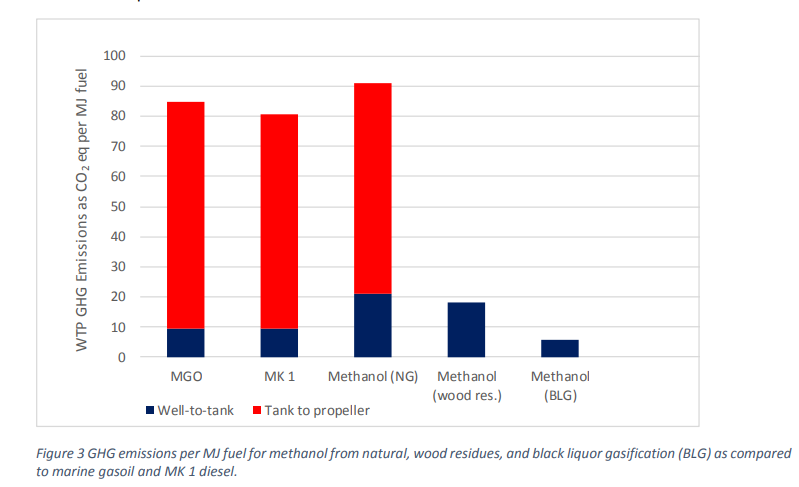There are no obstacles to the efficient use of methanol in a converted diesel engine was the key finding of a research concluded under the Sustainable Marine Methanol (SUMMETH) project, which has backed the increased use of methanol as a marine fuel. The research also found that smaller vessel conversion projects are feasible and cost-effective, with levels of safety that easily meet existing requirements.
The SUMMETH project, supported by the MARTEC II network and funded by the Swedish Maritime Administration, the Methanol Institute, Region Vastra Gotaland, and Oiltanking, seeks to advance the technological development of methanol as an alternative fuel for coastal and inland waterway vessels to reduce their carbon footprint. Switching to methanol could namely offer close to zero SOx and particulate matter emissions and significantly lower NOx emissions compared to conventional marine fuels or biodiesel.
Joanne Ellis, Project Manager for SSPA which led the research, says the partners sought to build on the work already done in earlier research projects that resulted in the Stena Lines and Waterfront Shipping methanol dual-fuel vessels, using a vessel type that could use Methanol in a converted single-fuel engine.
The work on Stena Germanica and the Waterfront Shipping vessels proved the dual fuel concept in larger vessels; we wanted to understand whether conversion of a smaller engine was feasible. We looked at a road ferry with an engine capacity of about 350 kW which makes short trips between the mainland and the island of Ljusterö in the Stockholm archipelago, carrying people as well as cars, where there was a real desire to improve the emissions profile.
Topic areas of the project’s final reports include the technical feasibility of converting vessels to propulsion using methanol, the resulting environmental performance, bunkering issues and fuel supply now and in the future.
Key findings
- A fuel life cycle comparison with conventional diesel fuels used for smaller vessels showed that the use of renewable methanol from feedstock, such as wood residuals and pulp mill black liquor, can result in GHG emissions reductions of 75 to 90%.
- Regarding distribution of methanol to smaller vessels, there are no barriers anticipated as many smaller vessels are already bunkered by tanker truck for conventional fuels.
- Conversion designs: Development of a case study design for a Swedish road ferry showed that converting a road ferry is a realistic undertaking, and that monitoring, serviceability, and safety can meet existing requirements.
- The only barriers appear to be uncertainty about a market for the fuel, as production cost estimates are currently higher than conventional fuel.
 As biomethanol increasingly becomes available, Dr Ellis adds, vessel operators will have the opportunity to blend in the zero-carbon fuel and progressively meet emission reduction targets set by IMO.
As biomethanol increasingly becomes available, Dr Ellis adds, vessel operators will have the opportunity to blend in the zero-carbon fuel and progressively meet emission reduction targets set by IMO.
The Swedish government has recently asked the country’s Transport Administration to investigate making all of its ferries, pilot boats, icebreakers and workboats fossil-free by either 2030 or 2045, something that could make Biomethanol increasingly attractive. Sweden has the potential to satisfy required demand for the Biomethanol, which can be produced from renewable feedstock such as pulp mill waste, and there are several initiatives underway investigating the production of sustainable methanol.
Chris Chatterton, Chief Operating Officer of the Methanol Institute, added:
These are encouraging results which reinforce our view that Methanol provides one of the simplest, most efficient and cost-effective ways for the industry to comply with 2020 regulations and future CO2 emissions limits. The reductions not just in SOx and NOx but also PM will offer immediate environmental benefits, with the potential for Biomethanol to be progressively blended into the mix as more becomes available.
The research programme was conducted by SSPA, ScandiNAOS, Marine Benchmark, Lund University, the Swedish Transport Administration Road Ferries, Scania, SMTF and VTT Technical Research Centre of Finland.
The SUMMETH project results show that methanol can be used efficiently as a fuel in marine diesel engines, and smaller vessel conversion designs are feasible. There are significant environmental benefits to be realized from using methanol as fuel, including significantly lower emissions of particulates during combustion, and large reductions in GHG emissions if sustainable methanol is used.
Explore more herebelow:





























































